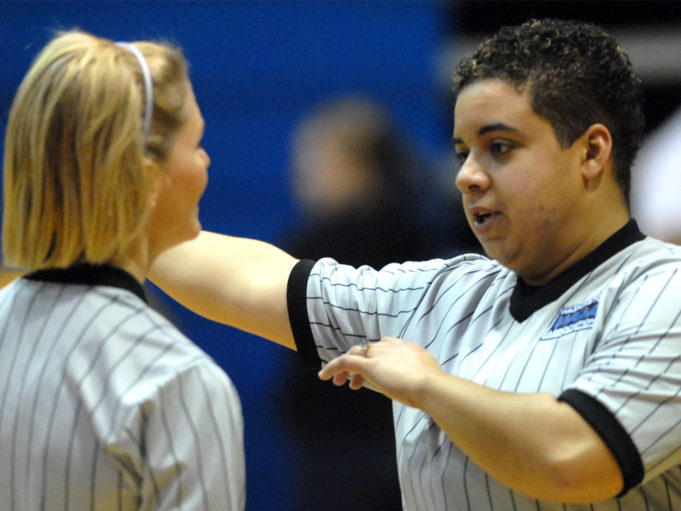By Jerry Grunska
Newer officials don’t always know what they’re getting themselves into. There’s a lot to learn, and it goes beyond rules and procedures. Here’s some advice from one veteran to newbies.
Mentoring.
I had a mentor when I started to officiate football. He knew the rules thoroughly. I did not. I had a scattering of knowledge, but basically I relied on him for the finer points. He was an exceptional administrator, widely respected. He knew instinctively how to placate loud-mouthed coaches. And despite the fact that we “sort of” took mechanics for granted (“I’ll stand here if you’ll stand there”), we muddled through and had some terrific games.
Foreknowledge.
I wish I had known a little more about rivalries. Some schools in conferences we worked had histories of animosities that were subdued by the everyday culture but erupted almost predictably when games were played. Those were communities where proximity was such that factions were exposed in competition — either religious differences, ethnic opposites or blue-collar vs. white-collar encounters. We handled the blow-ups all right, but I would have appreciated knowledge of when to expect them. In some places you could have been forewarned by reading news accounts leading up to the game, last year’s bitter upset and so on.
Breaking in.
When I moved to a Chicago suburb in 1960, I attended an association meeting and discovered the shiver that the cold shoulder and the fish eye could deliver. Leagues were expanding rapidly and new assigning individuals were being installed, but their whereabouts were kept secret, away from nosy newcomers.
That sounds amazingly illogical but it was true. If you could pry an address or a phone number out of a veteran official, that was almost a major feat.
At length I became an officer in the association, and the first thing I did was compile a directory of assignment chairmen and present it to our members.
I also did something no one else had done. Once I uncovered the key assigners, I contrived a brief but pointed letter of my qualifications and sent it as an introduction. I listed about two dozen assertions such as, I study the rules regularly, reading the entire book once a year. I will not scold the players (some officials operated that way). I run hard to get in shape and once ran with the bulls at Pamplona (OK, the last part was a fabrication, but the premise of working out to stay in shape was not). I am not pear-shaped, etc.
Some of the other items were also whimsical, of course, meant to get attention, while others were serious about what I would, as the saying goes, “bring to the table.” An aside: About 20 years later an assignment person reminded me of my introductory memo and his amusement. “You still don’t look pear-shaped,” he said.
Get educated.
I figured there were dozens of leagues around the perimeter of Chicago and hundreds of aspiring football officials. I was intent on standing out.
In those days, associations didn’t put much effort or emphasis into formal training. They didn’t really know how to go about the process. To counter that blasé attitude, several of us developed a formal program that we conducted through a large school district’s adult evening offerings.
At first we focused on the intricacies of rules (that was meant as a recruitment appeal also), because we had knowledgeable presenters. But then we branched out in trying to inculcate advanced game techniques such as identifying keys and illustrating how to shift focus during plays. The mechanics manual was of minimal value in those times. It stipulated coverage by areas of the field and said that officials should be supervising their area.
Well, we analyzed the best ways to identify a point of attack (a new football term in the 1970s), which players to follow at the snap, ways of covering passes and long runs, systems of obtaining accurate progress spots (squaring off instead of angling in) and things like that. We built the course for in-depth learning that I could have used when I entered the field.
The same principles apply today, of course. And there is a lot more information out there now than ever before.
We would have benefited immensely by today’s use of video. Some film documentation was in use then, but it generally showed only players executing plays, from the snap to the whistle. Images of officials were mostly outside the lenses. By assisting in that class, I could say that I learned late but I learned good.
That’s a good chunk of what I learned for you to use. Take it and run with it, just like the bulls in Spain.
Jerry Grunska, a retired official and educator, is a frequent contributor to Referee. He lives in Evergreen, Colo.
What's Your Call? Leave a Comment:
Note: This article is archival in nature. Rules, interpretations, mechanics, philosophies and other information may or may not be correct for the current year.
This article is the copyright of ©Referee Enterprises, Inc., and may not be republished in whole or in part online, in print or in any capacity without expressed written permission from Referee. The article is made available for educational use by individuals.


















